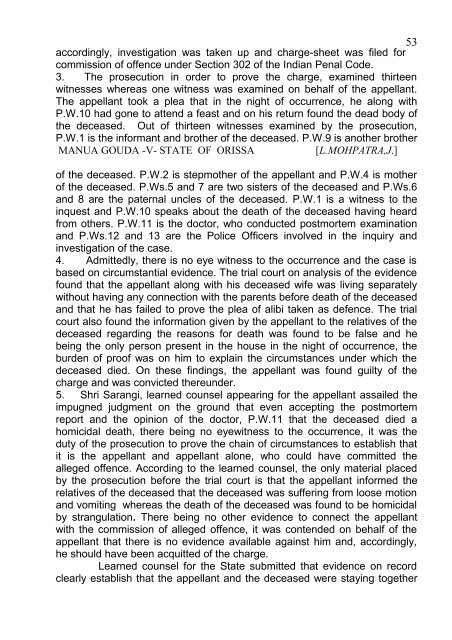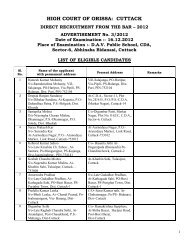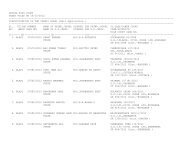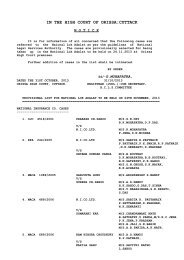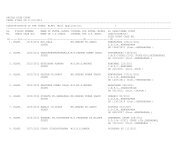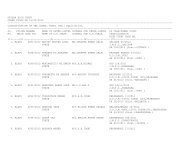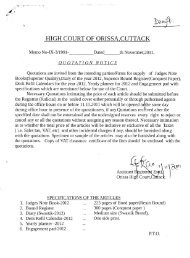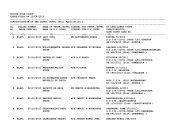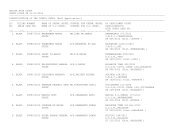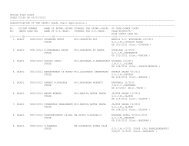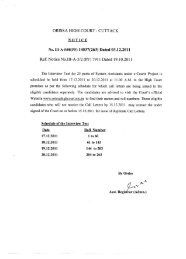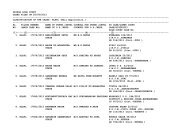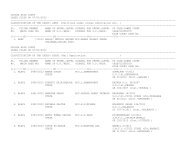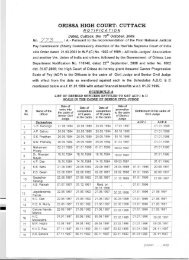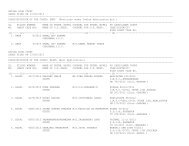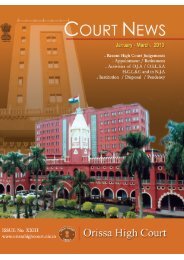ORIGINAL JURISDICTION - Orissa High Court
ORIGINAL JURISDICTION - Orissa High Court
ORIGINAL JURISDICTION - Orissa High Court
Create successful ePaper yourself
Turn your PDF publications into a flip-book with our unique Google optimized e-Paper software.
53<br />
accordingly, investigation was taken up and charge-sheet was filed for<br />
commission of offence under Section 302 of the Indian Penal Code.<br />
3. The prosecution in order to prove the charge, examined thirteen<br />
witnesses whereas one witness was examined on behalf of the appellant.<br />
The appellant took a plea that in the night of occurrence, he along with<br />
P.W.10 had gone to attend a feast and on his return found the dead body of<br />
the deceased. Out of thirteen witnesses examined by the prosecution,<br />
P.W.1 is the informant and brother of the deceased. P.W.9 is another brother<br />
MANUA GOUDA -V- STATE OF ORISSA [L.MOHPATRA,J.]<br />
of the deceased. P.W.2 is stepmother of the appellant and P.W.4 is mother<br />
of the deceased. P.Ws.5 and 7 are two sisters of the deceased and P.Ws.6<br />
and 8 are the paternal uncles of the deceased. P.W.1 is a witness to the<br />
inquest and P.W.10 speaks about the death of the deceased having heard<br />
from others. P.W.11 is the doctor, who conducted postmortem examination<br />
and P.Ws.12 and 13 are the Police Officers involved in the inquiry and<br />
investigation of the case.<br />
4. Admittedly, there is no eye witness to the occurrence and the case is<br />
based on circumstantial evidence. The trial court on analysis of the evidence<br />
found that the appellant along with his deceased wife was living separately<br />
without having any connection with the parents before death of the deceased<br />
and that he has failed to prove the plea of alibi taken as defence. The trial<br />
court also found the information given by the appellant to the relatives of the<br />
deceased regarding the reasons for death was found to be false and he<br />
being the only person present in the house in the night of occurrence, the<br />
burden of proof was on him to explain the circumstances under which the<br />
deceased died. On these findings, the appellant was found guilty of the<br />
charge and was convicted thereunder.<br />
5. Shri Sarangi, learned counsel appearing for the appellant assailed the<br />
impugned judgment on the ground that even accepting the postmortem<br />
report and the opinion of the doctor, P.W.11 that the deceased died a<br />
homicidal death, there being no eyewitness to the occurrence, it was the<br />
duty of the prosecution to prove the chain of circumstances to establish that<br />
it is the appellant and appellant alone, who could have committed the<br />
alleged offence. According to the learned counsel, the only material placed<br />
by the prosecution before the trial court is that the appellant informed the<br />
relatives of the deceased that the deceased was suffering from loose motion<br />
and vomiting whereas the death of the deceased was found to be homicidal<br />
by strangulation. There being no other evidence to connect the appellant<br />
with the commission of alleged offence, it was contended on behalf of the<br />
appellant that there is no evidence available against him and, accordingly,<br />
he should have been acquitted of the charge.<br />
Learned counsel for the State submitted that evidence on record<br />
clearly establish that the appellant and the deceased were staying together


